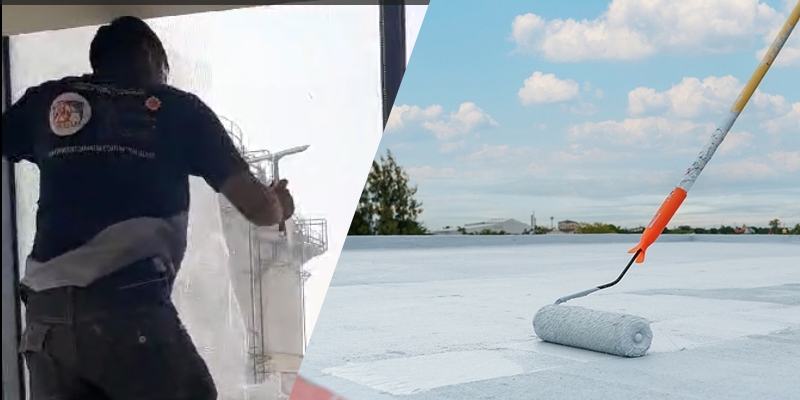
Nanotechnology Glass Coating vs. Traditional Cooling Methods
As homeowners and building managers search for effective ways to improve energy efficiency and comfort, window glass coating solutions have become increasingly popular. Among these solutions, nanotechnology glass coating and traditional cooling methods are often compared. This article delves into both options, providing in-depth insights and practical tips to help you make an informed decision for your residential or commercial building.
What is Nanotechnology Glass Coating?
Nanotechnology glass coating involves applying a microscopically thin layer of nanoparticles to window glass. This advanced coating enhances the glass’s properties, providing benefits such as UV protection, heat reduction, and improved durability. One notable example is HeatCure glass coating, which blocks 80% of heat passing through glass, uses Japanese nanotechnology, and offers a warranty of 10 to 12 years.
Benefits of Nanotechnology Glass Coating
- Energy Efficiency: One of the most significant advantages of nanotechnology glass coating is its energy efficiency. By reflecting infrared radiation, these coatings help keep interiors cooler, reducing the need for air conditioning. This translates to lower energy bills and a smaller carbon footprint. HeatCure glass coating, for instance, blocks 80% of infrared rays, which constitute 53% of sunlight and are primarily responsible for heat.
- UV Protection: Nanotechnology coatings block up to 99% of harmful UV rays, protecting interior furnishings from fading and degradation over time. UV rays, which make up 47% of sunlight, are known to cause discomfort and diseases like skin cancer.
- Enhanced Durability: The coatings improve the scratch resistance and overall strength of the glass, extending its lifespan and reducing maintenance costs.
- Aesthetic Appeal: These coatings are nearly invisible, maintaining the aesthetic appeal of the glass while providing superior performance. The HeatCure glass coating, for instance, allows 78% visual light transmission, ensuring visibility while offering protection.
What are Traditional Cooling Methods?
Traditional cooling methods for windows include various treatments and installations aimed at reducing heat gain. Common methods include window tinting, reflective films, and the use of curtains or blinds.
- Window Tinting and Films: While effective at reducing glare and heat, window tinting and films do not offer the same level of UV protection or energy efficiency as nanotechnology coatings. They can also alter the appearance of the glass, which may not be desirable for all homeowners.
- Curtains and Blinds: These solutions are cost-effective and can significantly reduce heat gain when used properly. However, they block natural light, which can reduce the overall comfort and appeal of indoor spaces.
- Reflective Films: Reflective films are another traditional method, but they can create mirror-like reflections that may not be aesthetically pleasing and may violate certain building codes or homeowners’ association rules.
Home Window Glass Coating Options
When choosing the best glass coating option for your home, consider the following factors:
- Climate and Location: If you live in a hot climate, nanotechnology glass coatings may offer significant energy savings by reducing cooling costs. In contrast, traditional methods might suffice in milder climates.
- Budget: Nanotechnology coatings can be more expensive initially but offer long-term savings through reduced energy bills and maintenance costs. Traditional methods may have lower upfront costs but could be less cost-effective over time.
- Aesthetic Preferences: Nanotechnology coatings are nearly invisible, making them an excellent choice if you want to maintain the original appearance of your windows. Traditional methods can alter the look of your windows, which might be a consideration for some homeowners.
- Energy Efficiency Goals: If maximizing energy efficiency is a priority, nanotechnology glass coatings are the superior choice due to their advanced heat-reflective properties and UV protection.
Energy Efficiency of Nanotechnology Glass Coating
- A study by the U.S. Department of Energy found that windows treated with nanotechnology coatings can reduce cooling energy consumption by up to 30%.
- Homes equipped with these coatings can save up to 15% on annual energy bills, translating to significant cost savings over the years.
- By blocking 99% of UV rays, nanotechnology coatings protect indoor furnishings and reduce the need for expensive replacements.
Practical Tips for Implementation
- Consult a Professional: Engage with a professional installer who can assess your specific needs and recommend the best nanotechnology coating for your home or building. The application process for HeatCure glass coating, for instance, involves cleaning, priming, and application.
- Follow Maintenance Guidelines: For optimal results, do not clean the glass for 20 to 25 days after application to ensure the coating sets properly.
- Consider the Long-Term Savings: While the initial investment may be higher, the long-term energy savings and durability benefits make nanotechnology glass coatings a cost-effective solution.
Conclusion: Making the Right Choice for Your Home
When comparing nanotechnology glass coatings vs. traditional cooling methods, it’s clear that nanotechnology coatings offer superior benefits in terms of energy efficiency, UV protection, and aesthetic appeal. For homeowners and building managers looking for a long-term solution that enhances comfort and reduces costs, investing in nanotechnology glass coating is a smart choice.
- Energy Efficiency: Nanotechnology coatings significantly reduce cooling costs by reflecting infrared radiation. HeatCure glass coating blocks 80% of heat from IR rays.
- UV Protection: These coatings block up to 99% of harmful UV rays, protecting your interior furnishings and health.
- Durability and Aesthetic Appeal: Nanotechnology coatings enhance the durability of your windows without altering their appearance. HeatCure allows 78% visual light transmission.
- Cost-Effectiveness: Despite higher initial costs, the long-term savings make nanotechnology coatings a wise investment.
If you’re considering upgrading your home or building’s window treatments, explore the benefits of nanotechnology glass coating. Consult with a professional installer like HeatCure to find the best solution for your needs, and start enjoying enhanced comfort and energy savings today.



Comment (0)